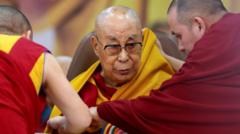Inside the chapel, the cardinals will engage in a series of rounds of secret voting, aiming for a two-thirds majority needed to elect the new pope. The process can be swift or prolonged, taking anywhere from mere hours to, historically, nearly three years. As the cardinals cast secret ballots each day, they will signal the outcome of their deliberations through the colored smoke emanating from the chimney atop the chapel—black for no decision and white when a new pope is elected.
Jason Horowitz, the Rome bureau chief for The New York Times, who is well-versed in the machinations of papal elections, highlights the political intricacies involved. “The process can get quite theatrical, filled with backstabbing and maneuvering,” he notes. As the cardinals plot and position themselves, the tension mounts regarding potential dark-horse candidates who may emerge unexpectedly.
The media prepares for this momentous election, with news outlets ready to relay the announcement of the new pope to the world at lightning speed once the smoke signals a decision. The implications of this conclave extend beyond mere politics; it marks a pivotal chapter in the global faith community as millions await the announcement of a new spiritual leader.
Jason Horowitz, the Rome bureau chief for The New York Times, who is well-versed in the machinations of papal elections, highlights the political intricacies involved. “The process can get quite theatrical, filled with backstabbing and maneuvering,” he notes. As the cardinals plot and position themselves, the tension mounts regarding potential dark-horse candidates who may emerge unexpectedly.
The media prepares for this momentous election, with news outlets ready to relay the announcement of the new pope to the world at lightning speed once the smoke signals a decision. The implications of this conclave extend beyond mere politics; it marks a pivotal chapter in the global faith community as millions await the announcement of a new spiritual leader.





















